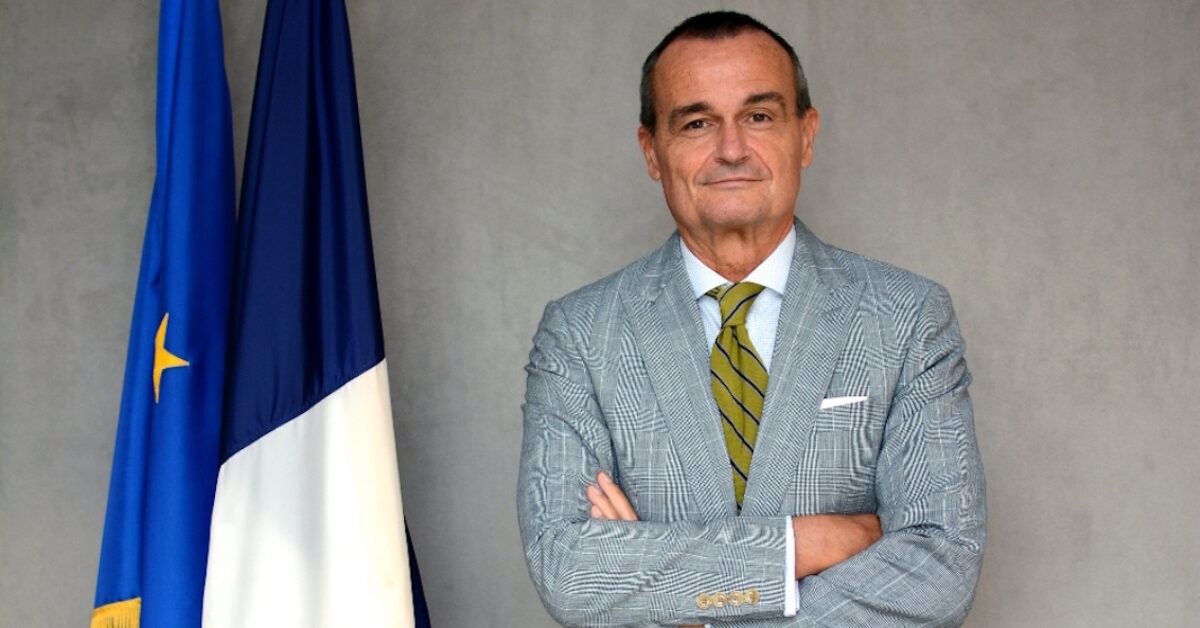On Friday, April 19, the French ambassador to the United States moved to New York to make a new start. Gérard Araud put his entire life in cardboard boxes in Washington D.C., and brought them to his new apartment on the Upper East Side. He leaves behind an empty embassy for the moment, since his successor has not yet been appointed. According to our information, it’ll likely be Philippe Etienne, French President Emmanuel Macron’s current diplomatic adviser at the Elysée.
Before leaving, Araud spoke to French Morning about his new life, and challenges and regrets during his long career. After 40 years in the service of France’s Quai d’Orsay, working in many roles, such as Ambassador of France to Israel, Director General for Political Affairs and Security, and Permanent Representative of France to the United Nations, this ambassador unlike any other looks forward to a peaceful retirement from diplomacy.
He feels “young,” he jokes. “When you are 66 years old in France, you are supposed to write your memoirs and play pétanque,” he explains, confident that he should start writing a column in a monthly French newspaper and continue his collaboration with the think-tank Atlantic Council.
Although he does not plan to play pétanque, he has already written his memoir, which will be published next autumn. Don’t expect any juicy anecdotes. He explains that he approached this writing “in a totally technocratic way,” speaking very little about himself, but focusing mainly on “major foreign policy issues” and the election of Donald Trump. “His election is as important as the election of Ronald Reagan, because it’s the end of a neo-liberal era, of free trade, of confidence in the markets,” he continues. For him, it is a historical moment marked by “the return of borders, the role of the protectionist state, the return of nationalism.”
Don’t tell Araud, a Twitter fan, that he his style is “not particularly diplomatic.” “Obviously, you’re not an ambassador in the United States in 2019 in the same way you’re an ambassador in China in the 13th century,” he says. For more than five years, he has used his Twitter account as a diplomatic weapon, a method that has given him moments of pride, but also regret. “I made mistakes and I wanted to experiment, there are times when you toe the line,” he explains, perhaps referring to his famous tweet sent on November 9 at 2 a.m. after Trump was elected president. The ambassador tweeted: “After Brexit and this election, anything is possible. A world is collapsing before our eyes. Vertigo.” He deleted it two minutes later. “This is an example of a tweet I could have spared myself of,” he says. “I was right about the substance, but I was wrong about its expression.”
Twitter also allowed him to defend his country in the media, for example, to call out the host of The Daily Show Trevor Noah after the victory of the French team in the World Cup. During the July 17 episode, Noah joked, “Africa won the World Cup” referring to the heritage of the players. Through a press release published on Twitter just a day later, the ambassador explained to the host that “unlike in the United States, France does not refer to its citizens based on their race, religion or origin.”
“I’m proud to have defended the players of the French team,” he says today. He refused the invitation to go to the set for a face-to-face meeting. “I figured I couldn’t stand up to a comedian of his talent and I decided to leave it at that.”
These two tweets cannot sum up 40 years of service for the Quai d’Orsay, 14 of which were spent on American soil. During this period, he worked for two very different governments. Appointed French Ambassador to the United States in 2014, he began his term under the Obama administration. Obama was a “meticulous” president who “ran his administration in a traditional and relatively easy way,” he recalls. Several occurrences brought the two men together. They met after the Charlie Hebdo attack and murders at a Jewish supermarket in January 2015 (when the former president came to sign the Embassy’s book of condolences), and again after the terrorist attacks on November 13, 2015.
Relations with the Trump administration have been more complicated. It’s “a difficult situation,” says the ambassador, who points out that “two years after his election, a large share of the offices are empty, that is to say that senior officials have not been appointed or if they have been appointed, they’ve left quite quickly.”
Araud has been speaking even more freely about the Trump administration and Washington since leaving his post. In an interview with The Guardian he compared the Trump administration to the Sun King of France: “It’s like [trying] to analyse the court of Louis XIV,” Araud said. “You have an old king, a bit whimsical, unpredictable, uninformed, but he wants to be the one deciding.” He told The Atlantic that Jared Kushner has “no guts” and Politico that Washington is “a bit hysterical.”
When asked for a highlight in his career, Araud doesn’t hesitate. “Resolution 1973 in 2011.” That year he was France’s ambassador to the United Nations and voted for an intervention in Libya. “It’s a moment that is at the same time both rich and also a moment of questioning,” he recalls. “It’s an exciting memory, I had to make personal and singular decisions,” he says, explaining that once the decision was made, military intervention is “always an open debate today.” Was it a good or bad decision in hindsight? The ambassador admits, “I don’t know the answer.”






